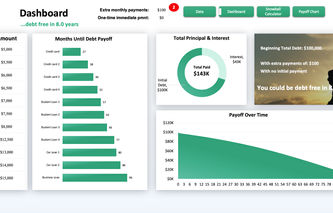Consumer service workers are like superheroes—
They can transform from stressed-out Sam, who woke up at 4 a.m., to all-smiles Samuel, who absolutely doesn’t want to be back home in bed.
This article will tell you—
Is consumer services is a good career path?
What is the consumer services industry?
How much jobs in consumer services pay.
The pros and cons of working in consumer services.
Their powers of patience can withstand everything—from screaming kids demanding nuggets at a fine-dining French restaurant, to their parents complaining about the lack of hot dogs on the menu. But superhero life isn’t for everyone (just ask Iron Man)—so let’s see if it’s all it’s cracked up to be.
Is Consumer Services a Good Career Path?
Working in consumer services is a good career path for those who enjoy interacting with and helping people from all walks of life.
You’ll also get the chance to learn valuable skills to use in future job pursuits and in your personal life.
One of the best things about consumer services is that many jobs don’t require a college degree to get stuck in—so you get the opportunity to gain work experience, skills, and some decent tips, without ending up with student debt.
There are plenty of roles to choose from and work your way up the ladder—whether you’ve been in higher education or not.
Just make sure you build a thick skin—as you’ll be dealing with some crummy customers, stressful situations, and demanding duties.
What Are Consumer Services?
Consumer services provide customers with experiences, services, or solutions that benefit them.
Whether you’re working with major companies or individuals, the consumer takes top priority (“the customer is always right”).
There are tons of options available—from giving legal advice to serving burgers, dealing with complaints, or trying to sell clothes to a nudist—your world will revolve around the consumer.
Types of Consumer Service Industries
Let’s dive into six key areas in the consumer services industry:
Customer support
Finance consumer services
Retail and sales
Technical support
Food and beverages
Hospitality and tourism
Customer Support
Salary: $26,000–$180,000
If you’re good at apologizing for things that aren’t your fault—or if you’ve mastered the art of treating customers with the same care and attention as a newborn puppy—you’re all set to work in customer support.
Your day-to-day will involve listening to customer complaints, helping solve any issues, offering assistance, and explaining that the text messages are sending—they’re just ignoring you.
There are plenty of remote positions where you’ll be chatting with customers via email, online chat, social media, or phone. But if your back just can’t handle sitting all day—you can also find in-person customer support roles.
One of the best things about customer support is that most employers only ask for a high school diploma. Everything else is taught on the job—from dealing with customers to learning about the company’s offerings and the art of smiling and nodding.
But if you really want to excel, you’ll also come equipped with plenty of patience and a long-lasting social battery. Being a clear communicator and having the problem-solving skills to think fast will also help you out.
Jobs in customer support include:
Customer support engineer
Call center representative
Customer support manager
Customer experience specialist
Technical support
Finance Consumer Services
Salary: $36,000–$190,000
Your friends always give you credit for splitting the bill six ways, dividing up the nachos everyone shared, calculating the tips, and finding out who had that extra drink. But you’d much rather swap out their thank-you’s with a few dollar bills.
Well, in finance consumer services, you get the gratitude and a nice salary to go with it.
Whether someone needs help with personal finances, or a customer’s crab business is feeling the pinch—you’ll be on hand to offer advice and guidance on how they can manage their money.
There are opportunities to work with personal clients or big companies—where you’ll be doing tasks like handling bookkeeping, creating financial strategies, and making investment plans.
To bag this role, you’ll need to have a head for numbers—endless zeros don’t scare you, and problem-solving is one of your favorite pastimes (and I’m not talking about fun riddles or jigsaw puzzles).
But a passion for numbers alone isn’t enough—most employers prefer those with a degree in business, economics, finance, or a related field.
Jobs in financial consumer services include:
Personal finance planner
Banker
Financial analyst
Loan officer
Insurance agent
Retail & Sales
Salary: $22,000–$170,000
If you’ve seen one retail job, you’ve seen the mall—and you’re probably aware that “retail therapy” doesn’t apply to the workers.
It’s no secret that working in sales has its challenges—as well as selling products and services, you’ll be resolving complaints, interacting with shoppers, and handling payments (plus folding, re-folding, folding, and re-folding the growing pile of jeans).
If you’re not pursuing your dreams in retail fashion—you’ve got plenty of other areas to choose from. There are a bunch of retail positions in the financial sector, real estate, electronics, healthcare, and food and beverages.
It all boils down to pinpointing a customer’s problem or need and coming up with five different ways to solve it (of course, it will always be whatever you’re selling).
Despite dealing with customers who just can’t accept that the $2 bag isn’t on sale—working in sales gives you the flexibility to work your way up without having a degree. But if you have one in business, marketing, or communications, it’ll definitely help you land those top jobs.
Jobs in retail and sales include:
Cashier
Store manager
Realtor
Sales associate
Account manager
Technical Support
Salary: $32,000–$100,000
The world is going digital—bad news for people who still use “please” and “thank you” when using Google search, but great news for all the tech nerds out there.
You’ll be working with everything technology—and as gadgets are developing faster than anyone can keep up with, your know-how will always be in demand.
If you have trouble connecting with customers face-to-face, you can offer advice and assistance about technical issues via live chat, phone, or email. You’ll have the option to work for companies, educational facilities, or for individual users.
Just be prepared to channel your inner Yoda when someone wants their laptop fixed after their kid threw it in the pool.
You’ll need plenty of tech knowledge to get into this field—so a degree in computer science, information technology, software development, or a related field is a big thumbs up.
Jobs in technical support include:
IT support analyst
IT technician
Field service technician
Tech manager
Technical support engineer
Food & Beverages
Salary: $11,000–$98,000
Working in the food and beverage industry means you’re never far from a good scoop—whether it’s serving a vegan customer in a steakhouse or watching a college student get through a hundred chicken nuggets after losing a bet.
In 2022, food and beverage sales stacked up to $880.3 billion—so there’s certainly no shortage of work.
You could be taking customer orders in fast-food restaurants, mixing cocktails in a tiki bar, or serving top-notch cuisine to the upper class (and their pooches) on a private yacht.
To make ends meat, you’ll be dabbling in food preparation, cleaning tasks, food transportation, and serving bowls of tinned soup as authentic Spanish gazpacho.
And with so many duties (plus an endless supply of hungry customers) don’t be surprised if you’re asked to work extra hours, including weekends and holidays.
Many positions don’t require formal education—especially for entry-level jobs, like servers and bartenders. You can also work your way to higher positions, but having a degree in hospitality should give you a direct ticket to the top.
Jobs in food and beverages include:
Server
Front of house
Bartender
Restaurant manager
Caterer
Hospitality & Tourism
Salary: $25,000–$118,000
Working in hospitality can involve donning elf costumes at Christmas, embracing your inner child for the hotel treasure hunt, or turning detective when you get complaints of suspicious smells coming from one of the rooms.
But aside from reenacting Sherlock, the main goal is to deliver five-star customer service in the areas of travel, tourism, events, and pigeon chasing (yes, that’s an actual job).
If you have reservations about working 9–5 in an office cubicle—working in hospitality and tourism lets you work in hotels, tour buses, travel agencies, tourist destinations, and on the road.
Depending on the job, you’ll need plenty of people skills, good communication, some business savvy, and the ability to come to work with a smile on your face—even after your kid decided to paint the walls with cereal at 7 a.m.
If you have the social skills, lots of charisma, and some decent experience, there’ll be a bunch of positions to choose from.
You can also fast-track your way to the perfect job with a degree in hospitality, tourism, business, or event planning.
Jobs in hospitality and tourism include:
Hotel manager
Flight attendant
Tour guide
Receptionist
Travel agent
How Much Do Consumer Service Jobs Pay?
The salary for a job in consumer services can vary depending on what area you’re working in your position.
The US Bureau of Labor Statistics says the median hourly salary of a retail sales worker is $14 an hour, while a sales manager earns around $61 per hour.
As a server, you can expect to be paid around $12.50 an hour, whereas food service managers can get about $29 an hour.
If you want to bag the big bucks—having a degree can be a fast-track to the top jobs. But there are also plenty of opportunities to work your way up from an entry-level position.
What Are the Best Careers in Consumer Services?
Here’s a breakdown of some of the top consumer service careers:
JOB | ANNUAL SALARY | REQUIREMENTS |
Customer service director | $142,899–$185,115 | Lots of experience in customer service or management |
Hedge fund manager | $118,182–$159,477 | Degree in finance, mathematics, or economics |
Sales manager | $61,090–$173,000 | Experience or a degree in marketing or business |
Financial advisor | $47,570–$208,000 | A degree in mathematics, finance, or social sciences |
Call center manager | $78,800–$104,500 | Experience or a degree in communications or business |
Accountant | $47,970–$128,970 | Degree in accounting or business |
Computer support specialist | $38,560–$102,410 | Degree in computer science |
Flight attendant | $37,020–$81,400 | High school diploma or business degree |
Real estate broker | $28,270–$102,170 | Real estate license |
Restaurant manager | $36,630–$98,070 | Experience or a degree in business or hospitality |
Is Finance Consumer Services a Good Career Path?
Yes, finance consumer services is a great career path.
If you’re skilled with numbers, you’ll find plenty of career opportunities and a wide range of salaries.
Working in finance can involve managing invoices, preparing reports, collecting financial data, and making sure your clients don’t go overboard with their budgets.
Getting a degree in finance, accounting, economics, or a related field is the best way to get into the finance industry—although some jobs will let you work your way up if you come with the right skills and experience.
Top jobs in finance consumer services and their salaries
Financial clerk ($29,000–$61,000)
Loan officer ($32,500–$138,00)
Financial manager ($77,000–$208,000)
Insurance agents ($29,500–$126,510)
Accountant ($47,500–$129,000)
Financial analyst ($57,500–$166,500)
Bank teller ($28,000–$46,500)
Financial examiner ($48,500–$161,000)
Budget analyst ($49,000–$124,500)
Finanical advisor ($47,500–208,000)
Other consumer services jobs
By now, we should have brought you up to speed with all jobs related to consumer services—but we have a few more up our sleeves if you’re still on the hunt for career inspiration.
If you thought working in the medical field requires being in education half your life (only a slight exaggeration)—you’d be wrong.
Patient care coordinators take care of their patients and all their medical needs—while medical receptionists are there to greet visitors and keep things running smoothly.
If you’re proud of your community, or you think it needs a long-overdue makeover—you can also work in community service, where you can show off your leadership, creativity and people skills to make your area a better place. Check out the 30 best-paying jobs in consumer services for a complete run-down.
Consumer Services: Pros and Cons
Here are the pros and cons of working in consumer services—
Pros
Learn valuable skills
As well as learning how to zone out (while also looking completely engaged) when a customer is complaining about finding an unknown hair in their shower, you’ll also build up useful skills:
Communication
Problem-solving
Adaptability
Creativity
Time management
Consumer services are also great for those less confident—you’re forced to interact with a range of people while learning how to deal with difficult, awkward or eyebrow-raising situations without breaking out in a sweat.
Meet new people
With options to work on a plane, at a busy fast-food joint, or on a booze cruise full of drunk college students—you’ll get the chance to meet people from all walks of life.
Not everyone you encounter will float your boat, but you’ll certainly come away with some interesting stories—the good, the bad, and the utterly bizarre.
While you’ll build resilience against the less desirable customers—you’ll also get some friendly interactions and meet people who genuinely appreciate the work you're doing.
Help customers
If you see your friend slip on the ice, are you the type of person to burst into laughter or rush to their help?
If you belong to the latter—first, you’re a better person than me, and second, a job in consumer services might be for you.
You’ll get the chance to fix problems, bring a smile to your customer’s faces and give them the tools to be more successful.
But, not every customer will appreciate the help—so let’s move on to the drawbacks of working in customer service.
Cons
Deal with unpleasant customers
Speak to anyone in customer service, and they’ll tell you they’ve had their fair share of rude customers—whether it’s the shopper who stays one hour after closing and doesn’t buy anything or the customer who demands a full refund on his meal after devouring the whole thing in five minutes.
You may face demanding customers who just can’t seem to see your point of view (or the way the world works).
Customers who don’t want to read the fine print or want you do the impossible are hard to avoid when working in consumer services—so building up a thick skin is key to brushing off any bad behavior.
Work irregular hours
The constant stream of people going on vacation, needing financial advice, or just needing a big greasy burger—means there’s always work for people in consumer services.
Sure, you might get a nice bonus for working over Christmas—but the irregular hours can leave you with sore feet and have you sporting the zombie chic look by the end of the day.
Many popular fast-food joints like McDonald’s, Denny’s, and Burger King have locations that are open 24 hours—so you might find yourself serving early morning partygoers, or the people going to work at 5 a.m. (wishing they were the partygoers).
Experience stress
Working in consumer service can lead to early mornings and drunken customers whose biggest life decision at that moment is between a crispy chicken sandwich and a spicy chicken sandwich (we’ve all been there).
Sure, some customers can provide a few laughs—but employees have often complained about how all the pressures and demands can lead to burnout and stress.
To work in consumer services, you’ll need to be able to handle stressful situations and not take what people say to heart—going home and leaving work behind you is a skill that’ll make those tough days much easier.
Which Companies Are in the Consumer Services Field?
Here’s a short list of the top companies offering positions in consumer services:
Walmart
Amazon
Costco
Pfizer
Apple
Talkdesk
Target
Disney
Hilton
Key Takeaway
Working in consumer services is a good career path if you’re a people person and don’t crumble easily under pressure.
Consumer services cover a lot of different fields and positions—so have a long think about what position is the best fits your skills and interests before you consider working in the industry.
And if you don’t fancy staying in this line of work forever, it’s also a great opportunity to build up useful skills which can you can apply in future job opportunities.

.jpg)




